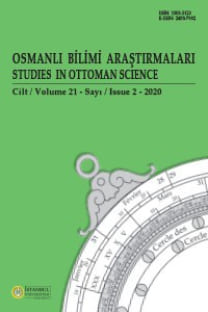Salih Zeki ve Çevresi
Intelligence, talent, cultural and scientific environment are doubtlessly among the factors that influence the formation of a scientist. Salih Zeki, the mathematician and historian of science was a prominent figure of the Turkish scientific life at the turn of the 20th century. The present article aims to explore the cultural milieu that conditioned his work, and Salih Zeki’s influence on Turkish scholars. Darüşşafaka, the college from which he graduated was the earliest institution that directed him to study sciences: Mehmet Nadir did not only teach him mathematics, but supported him throughout his career. The Ottoman Ministry of Post and Telegraph, by sending him to Paris for technical training, provided him with a new and scientific environment where he attended the courses of renowned university professors. His studies in Paris presumably colored his future work and undertakings. Back to Istanbul, he frequently attended the private meetings at Vidinli Tevfik Pasha’s mansion to discuss the current issues in physics and mathematics. Tevfik Pasha’s vast learning in mathematical sciences and his rich collection of books was for Salih Zeki a valuable source of knowledge. Salih Zeki’s teaching in various educational institutions and his administrative duties in the Ministry of Education gave him the opportunity to meet the notable figures of Turkish cultural life and high government officials. He taught mathematical and physical sciences for more than fifteen years in the Darülfünun (University) where he was the rector in 1913-1917. His Darülfünun years represented a strong influence on his students like Fatin Gökmen, the future director of the Kandilli Observatory, whom Salih Zeki promoted to study mathematical sciences and later invited to teach at the Darülfünun. The mathematician Hüsnü Hamid Sayman also seems to have been influenced by Salih Zeki’s studies on the history of mathematics. Though a good teacher of mathematical sciences and a scholar highly knowledgeable in history of science, Salih Zeki had almost no followers. This is either because this was not his objective or the cultural milieu in a declining Empire did not create a suitable milieu for this end.
Anahtar Kelimeler:
Salih Zeki, Darüşşafaka, Darülfünun, bilim tarihi, kültürel çevre, Mehmet Nadir, Fatin Gökmen, Vidinli Tevfik Pasha, Hüsnü Hamid Sayman
Salih Zeki and his cultural milieu
Intelligence, talent, cultural and scientific environment are doubtlessly among the factors that influence the formation of a scientist. Salih Zeki, the mathematician and historian of science was a prominent figure of the Turkish scientific life at the turn of the 20th century. The present article aims to explore the cultural milieu that conditioned his work, and Salih Zeki’s influence on Turkish scholars. Darüşşafaka, the college from which he graduated was the earliest institution that directed him to study sciences: Mehmet Nadir did not only teach him mathematics, but supported him throughout his career. The Ottoman Ministry of Post and Telegraph, by sending him to Paris for technical training, provided him with a new and scientific environment where he attended the courses of renowned university professors. His studies in Paris presumably colored his future work and undertakings. Back to Istanbul, he frequently attended the private meetings at Vidinli Tevfik Pasha’s mansion to discuss the current issues in physics and mathematics. Tevfik Pasha’s vast learning in mathematical sciences and his rich collection of books was for Salih Zeki a valuable source of knowledge. Salih Zeki’s teaching in various educational institutions and his administrative duties in the Ministry of Education gave him the opportunity to meet the notable figures of Turkish cultural life and high government officials. He taught mathematical and physical sciences for more than fifteen years in the Darülfünun (University) where he was the rector in 1913-1917. His Darülfünun years represented a strong influence on his students like Fatin Gökmen, the future director of the Kandilli Observatory, whom Salih Zeki promoted to study mathematical sciences and later invited to teach at the Darülfünun. The mathematician Hüsnü Hamid Sayman also seems to have been influenced by Salih Zeki’s studies on the history of mathematics. Though a good teacher of mathematical sciences and a scholar highly knowledgeable in history of science, Salih Zeki had almost no followers. This is either because this was not his objective or the cultural milieu in a declining Empire did not create a suitable milieu for this end.
Keywords:
Salih Zeki, Darüşşafaka, Darülfünun, history of science, cultural milieu, Mehmet Nadir, Fatin Gökmen, Vidinli Tevfik Pasha, Hüsnü Hamid,
___
- -
- ISSN: 1303-3123
- Yayın Aralığı: Yılda 2 Sayı
- Başlangıç: 1995
- Yayıncı: İstanbul Üniversitesi Edebiyat Fakültesi
Sayıdaki Diğer Makaleler
Ali Kuşçu ve Salih Zeki Sempozyumu Programı
Salih Zeki'nin Lobaçevski Geometrisini Tanıtan İki Konferansı
Salih Zeki’nin Lobaçevski Geometrisini Tanıtan İki Konferansı
Salih Zeki ve Astronomi: Rasathane-i Amire Müdürlüğü’nden 1914 Tam Güneş Tutulmasına
Salih Zeki ve Asâr-ı Bâkiye’nin 1960’larda Yapılmış Bir Çevirisi
Ali Kuşçu ve Salih Zeki Sempozyumu, İstanbul, 20-21 Aralık 2004
Sali Zeki ve 'Ecnebi Postahaneleri' nin Kaldırılması Konusundaki Görüşleri
Salih Zeki’nin ‘Teslis-i Zaviye’ Konusundaki “Bir Hendese Meselesi” Adlı Yazı Dizisi
